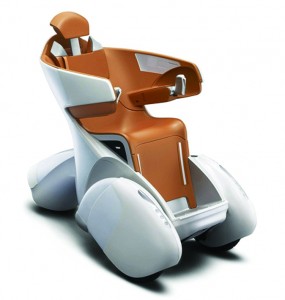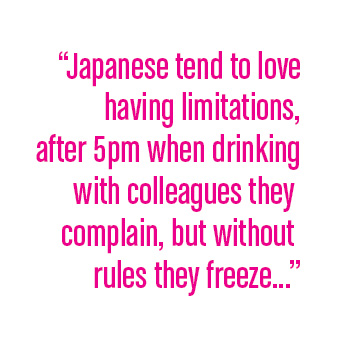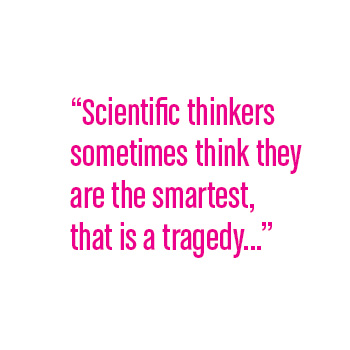Morinosuke Kawaguchi is proud to be a geek. His office is full of brightly colored mobile phones, his packed book shelves are guarded by Anime figurines and his hands are constantly clicking and playing with toys designed for children. His latest English book, Geeky-Girly Innovation: A Japanese Subculturalist’s Guide to Technology and Design, takes readers on a tour of Japan’s Otaku sub-culture telling the story of why Japanese products are the way they are and how companies can tap into this idiosyncratic world to stay ahead. Morinosuke’s off-the wall ideas may be just what Japan needs to kick-start a creative revolution.
“In Japan we are always looking for what we don’t have,” he says “It looks like we don’t have any culture but actually we have a lot. It was only when I started analyzing products from around the world, that I understood what it meant to be Japanese.”
Morinosuke’s work examining products removes much of the cultural baggage that comes with studying foreign countries.
In the way a good player is not always a good coach, or speakers of a second language can often teach it better than natives; though study, you can understand more.
“The best way to understand a culture is to read foreign books or poems but language can be a real problem” he says. “For humans it’s so hard to understand others, but consumer products have no language—like music—something beyond spoken words, a meta-language. Once you get beyond language, culture is easy to understand. That is what I do. If you look at the products from different countries—even if you can’t speak to their designers, you can learn so much.”
Language has a huge impact on design explains Morinosuke, “One reason Germany leads in certain scientific areas is probably due to the language,” he says “but Japanese is very different: so ambiguous, so emotional and vague, almost like a song.”
“Japanese people are always singing, like birds tweeting each other, the message is often very subtle. Japanese is such a minor language globally, and is so different to others, it can be difficult for us to be understood.”
His ideas are glaringly obvious when we think about it: in Tokyo there are vending machines that politely say “Arigato” or toilets that mask sounds and smells to avoid embarrassment, to the eccentric “manner-mode pen” with a built in volume control—so pen clickers can avoid annoying colleagues: these products could have only come from Japan. When tourists arrive at Narita airport they often remark about the efficiency of trains or the high levels of service, but to many Japanese these things are the norm. Morinosuke thinks this is a good part of isolated island life, as the Japanese can incubate their culture away than others, but this can bring problems as “we can’t see others and so we cannot compare.”
 “When we engineer products we have to break them down into specifics: lines, numbers, hard data. Otherwise we can’t manufacture things, so products contain a database of local culture, via numbers. By breaking culture down and studying it, you can learn so much and gain a huge advantage” Morinosuke explains.
“When we engineer products we have to break them down into specifics: lines, numbers, hard data. Otherwise we can’t manufacture things, so products contain a database of local culture, via numbers. By breaking culture down and studying it, you can learn so much and gain a huge advantage” Morinosuke explains.
Such analysis of products is not a unilateral process, other countries can apply it too, and by understanding the why behind innovation, engineers can see which direction markets are headed.
“You know, I don’t just want my book translated into English, I want to do the same in other cultures―then I may notice something quirky they don’t. My goal is to make people think about products in a new way, it’s good for the market and good for us. If I went to Germany, the Germans could take a new look at themselves. ‘Ah, that’s why we add that feature on a Mercedes’”
The odd toys, games and culture of places like Tokyo’s ‘electric town’ Akihabara or fashionable Harajuku are often slated by the Japanese establishment, yet they are a strong pull for tourists and trend-hunters and can be a gold-mine of inspiration for designers.
“If we think Otaku or Gyaru culture is damned, we stop our culture from growing.” He says with a smile “They are the future, we have to adapt it into a strength, not a weakness. We really have no choice, it’s our responsibility, we raised them, we made them—we have to be responsible for them.”
 As a technology management consultant at Arthur D. Little Japan, with degrees from University of Illinois at Chicago and Keio University under his belt as well as a professorship at Tokyo Institute of Technology—he means business, but under his suit he is as wacky as the products he loves. Take the “Puchi-puchi” a bubble wrap simulator, that successfully replicates the addictive action of bursting bubble wrap, or the “endless edamame” a toy designed purely to copy the enjoyable routine of popping soy beans from their pod. These toys are made solely to entertain, yet contained in their design are hints for future human-computer interfaces, vehicle switches or even medical devices.
As a technology management consultant at Arthur D. Little Japan, with degrees from University of Illinois at Chicago and Keio University under his belt as well as a professorship at Tokyo Institute of Technology—he means business, but under his suit he is as wacky as the products he loves. Take the “Puchi-puchi” a bubble wrap simulator, that successfully replicates the addictive action of bursting bubble wrap, or the “endless edamame” a toy designed purely to copy the enjoyable routine of popping soy beans from their pod. These toys are made solely to entertain, yet contained in their design are hints for future human-computer interfaces, vehicle switches or even medical devices.
“I keep only one foot in the Otaku world, if I go too far in I can no longer see clearly. I still keep a distance and try and understand them objectively. I can talk to the products because I am so child like—I am living in a never-land!” he jokes.
Marketers have known for a long time that Japanese teenagers are great barometers of pop-culture, the super-dense shopping hubs of Shibuya and Shinjuku are like a laboratories of market research, but before companies gamble on the next big gadget or trend, the strange, often hidden worlds of Tokyo offer invaluable clues, if, that is, you can find them.
“When I stumble upon something new, I kind of feel like ‘Jesus, what the hell is this?’ It can sometimes be beyond my understanding, but I have to try and think, this is the path to the future because, what other options do we have?”
Morinosuke’s enthusiasm for sub-culture is enough to cause the Japanese establishment to have a collective heart attack, but what does he say to those conservatives who reject the current youth trends?
 “In any country, new culture is always disrespected, like hippies or punks, that’s because it’s new. If a new culture can survive for 100 years, it will become high culture. Look at Japan; even Kabuki was once a subculture, mocked in it’s time, Joruri puppets too, were made for kids or women—not for the samurai, now it’s high culture, simply because it survived.”
“In any country, new culture is always disrespected, like hippies or punks, that’s because it’s new. If a new culture can survive for 100 years, it will become high culture. Look at Japan; even Kabuki was once a subculture, mocked in it’s time, Joruri puppets too, were made for kids or women—not for the samurai, now it’s high culture, simply because it survived.”
Morinosuke’s years advising industry have given him an almost sixth sense when it when it comes to predicting business trends and he is determined that this geeky culture can point to a bright future for Japanese companies, but first they need to stop worrying.
“Japan is kind of stuck, people are worried, constantly asking ‘where can we go? What can we do?’ Our hope is the young people. Kid’s really are the future. I’m sick of people complaining. I heard that even in times of ancient Egypt or Greece adults would complain about the ‘pathetic generation of young people’, so it’s nothing new!”
His unique way of thinking is also applied to categorizing countries. For centuries, he points out that the West has led the world and therefore made the rules of business, and the smaller, less influential countries on the periphery have had to adapt to survive. In this model countries like the U.S are characterized as ‘masculine and strong’ and Japan is ‘feminine and weak’—yet he sees this difference as a huge advantage.
In Tokyo politicians, bureaucrats and the media seem obsessed with comparisons to other countries, especially Japan’s closest neighbors, but he points out there is nothing to fear from competition.
“If we compare ourselves to China and South Korea, we feel disappointed, we underestimate ourselves too much, we need to step back and appreciate what we have. If you were in the competitors position, how scary is Japan? Just imagine being in Taiwan or Korea? That is why they work so hard.”
“Korea will have problems, soon too. I am clapping for them because they are doing so well ‘good for Korea’ but from now on, they will have to find their own way. It’s easy to copy and be an underdog, but taking the lead is much harder as there is no model to copy. Countries on the edge of global culture may find this a challenge, but Japan should be a beacon, as we are adept at survival.”
That’s Morinosuke’s advantage, his foresight and the ability to join disconnected ideas together—he sees wonder in places most Japanese people overlook.
“We are a peripheral culture, so the surviving principle is how to reply quickly to a challenge. If you are in the epicenter, go ahead, change the rules, but we need to realize we are not.”
Most Asian countries belong to this periphery group, Morinosuke’s classifies them as ‘herbivores’, constantly looking around for threats. The image of young fragile woman so popular in Anime and videogames best represents this weakness, hence the “geeky-girly” part of his book.
“If you belong to the ‘weak girl’ section of his graph, Japan is the model for you. It is important to know where you belong, benchmark yourself, copy the good parts and learn from the bad parts. If your goal is misguided, if you belong to the other masculine segment and try to copy Japan, it won’t work, it will be very stressful. North-east Asia, especially Korea and Taiwan are similar to Japan, the last are the newest to modernize. Most of the Asian success stories belong to this model. They have benchmarked Japan very well and have even overtaken us. They learn where we have succeeded and where we have failed, they learned from us very well.”
 During a recent embassy speaking tour in Tokyo, Morinosuke raised a few smiles when describing the direction in which Japan should head. He made his point clear by pointing out design differences between cars designed around the world. (see left image). Looking at vehicles through Morinosuke’s eyes reveals so much: a Hummer could have only come from America, a bright red Ferrari is a clearly Italian, Volvo is practical and nordic, a BMW looks so, well, German and when it comes to Japan competing in the vehicle design race, it’s not the speedy Honda Type R’s or muscular Nissan Skylines that best represent the Japanese mindset, but the tiny, feminine vehicles like the iUnit, iSwing and iReal. This geeky girly direction, he believes holds the key for Japan’s survival.
During a recent embassy speaking tour in Tokyo, Morinosuke raised a few smiles when describing the direction in which Japan should head. He made his point clear by pointing out design differences between cars designed around the world. (see left image). Looking at vehicles through Morinosuke’s eyes reveals so much: a Hummer could have only come from America, a bright red Ferrari is a clearly Italian, Volvo is practical and nordic, a BMW looks so, well, German and when it comes to Japan competing in the vehicle design race, it’s not the speedy Honda Type R’s or muscular Nissan Skylines that best represent the Japanese mindset, but the tiny, feminine vehicles like the iUnit, iSwing and iReal. This geeky girly direction, he believes holds the key for Japan’s survival.
“It’s funny in Japan, if you said to someone ‘you have one million dollars and no regulations, what do you do?’ It’s an impossible question for most Japanese. This is the reaction type culture, Japanese always need something to react against to know who we are. ”
Rules, it seems, can fuel creativity; energy is ignited, and Japanese feel so comforted by the boundaries.
“Once you are in the regulated box, you can become the best engineer to solve the problem. Japanese tend to love having limitations, after 5pm when drinking with colleagues they complain, but without rules they freeze.”
In Shanghai, Seoul and Taipei today, a new generation of middle-class are emerging and quickly becoming like Japanese Otaku in everything but name. In fact Morinosuke’s work is hugely popular in those cities and he has even been the subject of TV talk-shows; often without his permission.
“It happens so fast in developing countries, the second generation of richer people love the Japanese sub-culture because the background of the culture is so similar, it’s a natural shift. Once people have enough food, housing and basic home comforts, then they naturally follow this model, maybe it’s because Japan is running just a little ways ahead in pop culture. When this new generation adopts a culture, they become the role model in that society to aspire to, ‘I want to be like him’, ‘I want to dress like her’ the culture in the Far-East is so close knit, it’s natural.
If you need proof, look to Tokyo’s shopping streets; Ginza has become like a petit Paris and all around Asia people are flocking to Japan to shop. What happens in Japan today, it seems, will be copied in Korea and China tomorrow.
This past decade, was such a turning point for technology across the whole world, but it’s not that Japanese scientists couldn’t keep up, a bottleneck has been reached across all industries. Take for example nano-technology, if only five machines in the world can see a carbon nano-tube, we have got to the point where it costs too much to go any further. This bottleneck is slowing progress down.
“We can do it,” he says “But business people always look for a return on investment, it simply costs too much to keep pushing boundaries.”
These limitations are being seen everywhere, buildings can’t get any taller, jets can’t go much faster and computer chips are struggling to take the next leap forward.
“It has always been ‘red-ocean’ business in Japan, we are always fighting against others, but we don’t have the hungry spirit any more, emerging market challengers are so much hungrier than us and so much more ambitious. Like the West was 100 years ago: we can’t go back there, nor should we try.”
Until recently, science was chemical reactions in laboratory flasks, now it is apps and cloud computers. In the past, once you made a scientific discovery, getting a new product to market was not that difficult. In Edison’s time, he could make lots of new prototypes and products but today it is impossible for one person to even make a hard drive, it has become too complicated. Now there is no clear border between science and technology, it’s seamless. The biggest issue now in tech management is what the technology is handling.
“It’s very different from what we learned before. The cost problem is a huge problem nowadays, the technology eats up too much money.”
The world of technology simply wasn’t prepared for this shift:
“What to do is much more difficult than how to do it. Before, how to make something was the real challenge. It used to be so clear, management of technology was clear, we knew what to do, the process of doing it was difficult. Now what to do is hard, the only advantage is speed.”
 It is now up to the unmeasurable things, creativity, artistry and in particular medical products, as human feelings are much harder to quantify. In fact, we have incredible technology in our pockets—now we need the creativity to generate new ideas on how to maximize it.
It is now up to the unmeasurable things, creativity, artistry and in particular medical products, as human feelings are much harder to quantify. In fact, we have incredible technology in our pockets—now we need the creativity to generate new ideas on how to maximize it.
“Just like creating smart phone apps; what’s the good idea? A good idea, can be implemented quite easily, now everyone has access to this technology, but thinking of creative ideas is so difficult.”
The definition of “creativity” doesn’t have to follow a global standard, and different countries naturally excel in different areas, as illustrated by his research.
“Creativity is so closely related to being a child, fantasy or curiosity, that is Japan’s strength. Childishness is our engine. In the U.S on the other hand the ‘hunter’ engine exists too, a weapon-making type of creativity.”
Japan’s future should not be in the direction of making weapons he insists, but in what Morinosuke calls “weak-support technology”, the complete opposite: machines designed to help disabled, sick or elderly people, a completely new field in which Japan could really lead the way: a blue-ocean.
“There is too much emphasis on military technology, I want to Japanize the world—but in a soft, cuddly way!”
 “This soft feminine design is not intentional” he explains “I even met the guy who made an eco car. He said ‘I wish I could have a car where we can touch the flowers on the street’ it’s such herbivore thinking! The underlying concept was so weak—not to model a tank or race car, but to touch a flower! He didn’t think like this on purpose, it often happens, it’s coincidence and its also fate, the car designer was an artist, not an engineer. That is why he made the car—that single idea really sums up Japan.”
“This soft feminine design is not intentional” he explains “I even met the guy who made an eco car. He said ‘I wish I could have a car where we can touch the flowers on the street’ it’s such herbivore thinking! The underlying concept was so weak—not to model a tank or race car, but to touch a flower! He didn’t think like this on purpose, it often happens, it’s coincidence and its also fate, the car designer was an artist, not an engineer. That is why he made the car—that single idea really sums up Japan.”
In the new world of technology a partnership is needed between artistic people and scientific people, if Japan can master this, a bright future awaits.
“Systematic thinking can never win over creativity. Scientists need to follow artists to discover why they do what they do. But often this is hard for people to take. Scientific thinkers are so good at explaining, that they mistakenly think they are smarter than artists, then the so called consultant, thinks he is even smarter still. Then disaster strikes.”
Artistic thinkers always make mistakes, that comes with the creative process, he points out, but it is not sufficient for success in business. Logical thinkers always need to work together with artists. In a way, the artist opens the road and the systematic thinker paves it.
“Scientific thinkers sometimes think they are the smartest, that is a tragedy.”
Geeky-Girly Innovation: A Japanese Subculturalist’s Guide to Technology and Design is available to pre-order now. Watch Morinosuke’s TEDx videos on YouTube.com
For more information on Arthur D. Little click here.
[br








